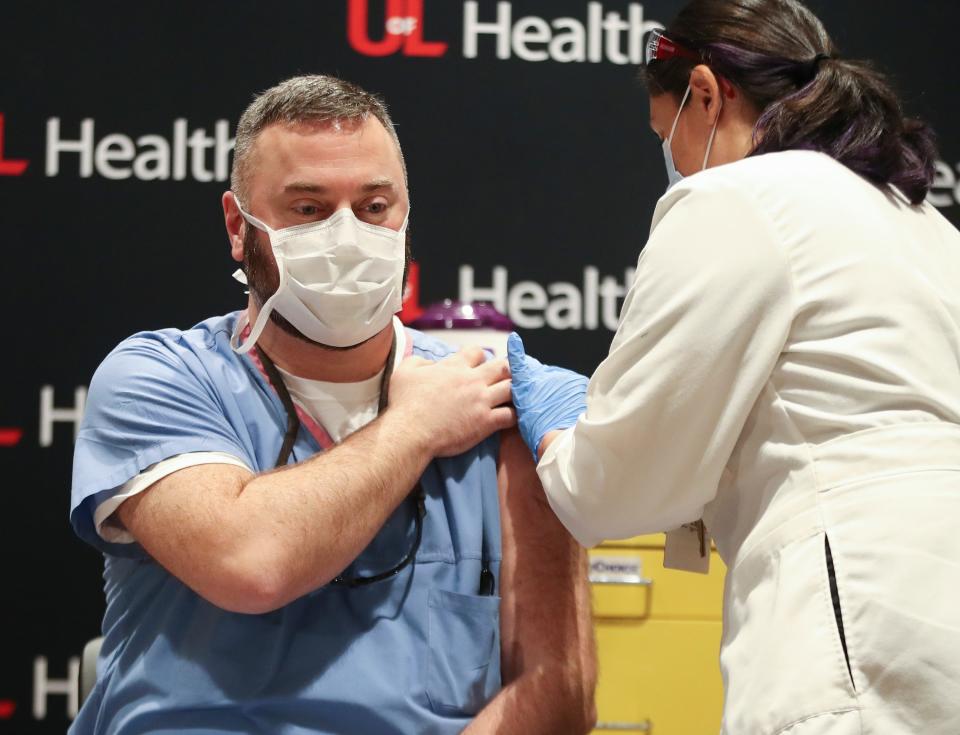How a new phase of fighting COVID requires the public to pay: Opinion
Our fight against COVID-19 is entering into a new phase. Due to lack of congressional funding, the Biden administration announced plans to curtail the funding of COVID-19 tests, treatments and vaccines shifting the financing and burden of the epidemic onto the public and private market. A few days later, Moderna announced it is suing Pfizer and BioNTech for alleged patent infringement.
This reminds me of the old African proverb, when elephants fight it is the grass that gets trampled. I cannot imagine how this is going to be good for the consumer.
Both Pfizer/BioNTech and Moderna have had enormous vaccine sales. Projections for 2022 estimate Pfizer will have $32 billion in sales and Moderna $19 billion. Only having a sole provider will corner the market. With the Federal Government out of the picture, prices may well rise, limiting vaccine access.
We are light-years away from when Jonas Salk, creator of the polio vaccine, was asked, who owned the patent? He replied: “Well, the people, I would say. There is no patent. Could you patent the sun?”
Despite the unfavorable consumer outlook, I would suspect that employers and insurance companies will continue to provide coverage.

More:Kentucky could get FDA-approved COVID boosters to target omicron variants soon
Medicare will continue to provide full coverage (no cost sharing charges such as deductibles and co-pays) for vaccinations, testing (Medicare Part B) and treatments (Medicare Part D) during the COVID-19 public health emergency. According to the Center on Budget and Policy Priorities, most private insurance and individual market plans must cover COVID-19 testing and vaccinations, without cost sharing charges, during the public health emergency. However, there are no special protections for treatments. Uninsured patients may have even greater reduced access to tests, vaccines and treatments. The COVID-19 public health emergency has been extended to Oct. 13, 2022.
Even without these safeguards, one can also make a strong financial case for insurance coverage of vaccines and rapid home testing. Using private insurance allowables, FAIR Health estimates that Kentucky has spent an average of $16, 959 per patient on non-ICU hospital care and $77,063 per patient on ICU care. As of March 7, 2022, this totaled over 1.1 billion dollars for hospital care.
More:Think you have long COVID? Here's what Louisville experts are saying
For employers, prevention is of paramount importance. Even “mild” illness can threaten services, as we have seen with the recent COVID-19 outbreak at Los Angeles International Airport where over 400 workers contracted the disease. But more problematic is the common occurrence of “mild” cases resulting in Long COVID. Recently, a controlled study from the Netherlands estimated that one in eight COVID-19 patients developed Long COVID. This is probably an underestimate, since the study did not capture CNS symptoms such as brain fog and memory problems. The Brookings Institution estimates that Long COVID has sidelined approximately 2% of the United States workforce, comprising between 2 to 4 million workers.
Vaccinations can greatly reduce the risk of workers developing Long COVID. Research published in JAMA Network has found that those who received a three-dose vaccine had an incidence of Long COVID of 16% after infection as opposed to 42% in the unvaccinated. Thus, financial support of worker vaccinations, along with testing and treatment, makes sense for employers too.
Unfortunately, in a free market, if usage of testing, vaccines and treatments drop, so will production. If another surge strikes our nation, we may not have the production capacity to rapidly meet the demand to blunt the surge.
For vaccine hesitant Kentucky, the lack of a uniform and easy to access vaccine and testing coverage may inflict an even higher toll. In the United States, only 67% of the population have received a two-dose vaccine, and only 32% have been boosted. Kentucky is even doing worse with 58% of the population having received a two-dose vaccine and 27% being boosted. Vaccinations are not a partisan issue. If Kentucky was a country, we would be 89th among the world nations, and with the BA.5 variant one must be boosted to have adequate protection.
Along with Kentucky’s recent devastating natural disasters, curtailing federal payment on vaccines, tests and treatments is another stressor which risks the health and well-being of Kentuckians. As calls for a national public healthcare system are becoming louder, this is a step in the opposite direction. The best advice is to take advantage of the vaccines, ordering of tests and the bivalent BA.5 booster which will be available in early September before federal coverage for all is suspended. The Federal government’s free mail order rapid testing program is set to expire on Sept. 2, 2022. Be sure to protect yourself and buy the necessary time needed for this transformation to sort itself out.

Kevin Kavanagh is a retired physician from Somerset, Kentucky, and chairman of Health Watch USA.
This article originally appeared on Louisville Courier Journal: How a new phase of fighting COVID requires the public to pay: Opinion

